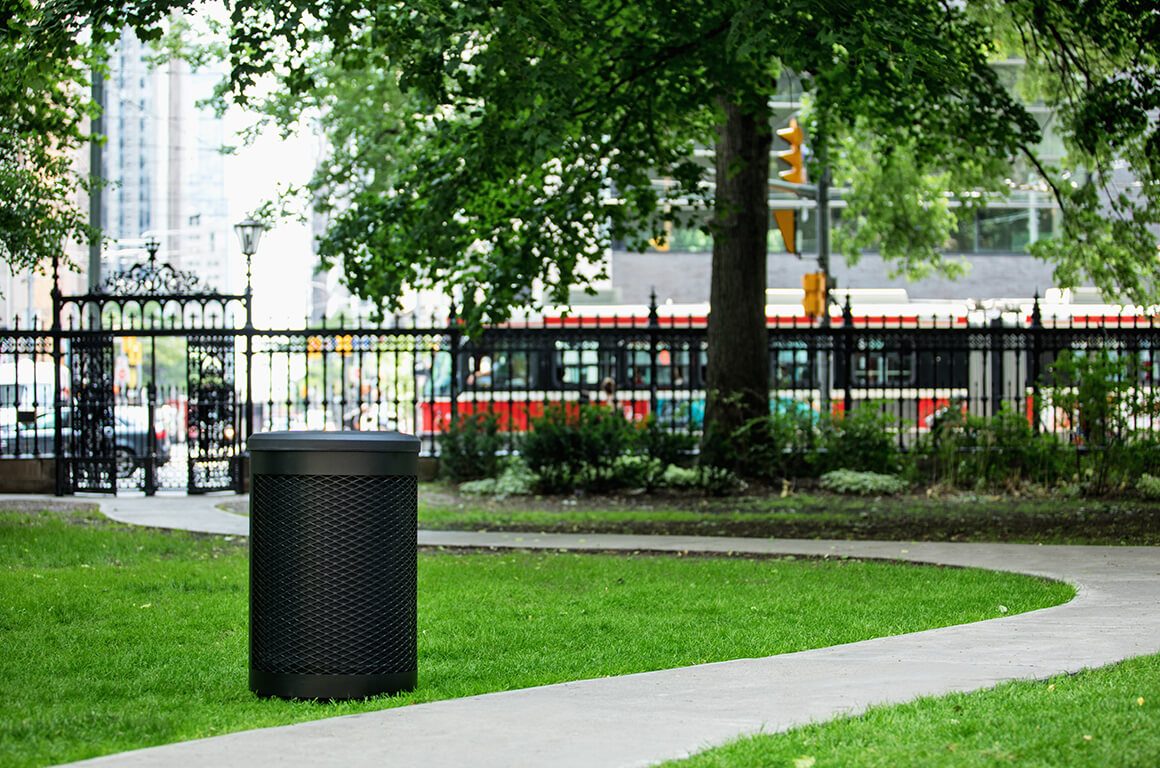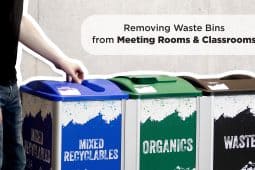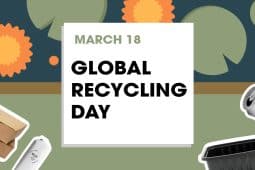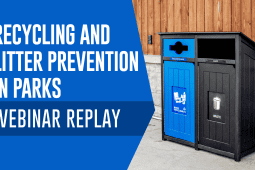
April 29, 2020 By Tim No Comments
An overview of the Economic, Social & Environmental benefits associated with building a solid waste management program.
Implementing and maintaining a community recycling program is never as simple as curbside collection or purchasing and placing containers in high traffic areas. Many challenges arise from collection, to litter prevention, to program communication.
Most municipalities have focused their recycling efforts toward curbside collection, but many have found success in adding recycling to their public community spaces such as parks, recreational centers, and municipal buildings. It has always been a priority to keep municipal grounds free of litter, but what if you were able to take your collection to the next level by incorporating recycling, and even organics, into your public spaces?
This may sound like more work than it’s worth but trust us when we say the benefits are too good to ignore.
Economic Impact
You’re probably thinking first and foremost about your budget. In order for this kind of program improvement to be approved, there have to be economic benefits. Well here’s some great news: In addition to the many social and environmental upsides to recycling, it can also be economically beneficial! Here’s how:
- Drastically Reduced Waste Removal Costs
Trash removal costs can be exorbitantly expensive in areas such as dense cities or remote areas. By removing paper, plastic and other recyclables from the waste stream, municipalities can cut their waste disposal bill by as much as 50 percent. A perfect example of a Municipality that has experienced the economic benefits of recycling is the Township of South Brunswick, NJ. A case study performed by the township’s recycling Coordinator in cooperation with Waste Wise determined that “recycling is 60% more cost effective than solid waste disposal on a cost per ton basis and a cost per pound basis”. Of course, every Municipality’s cost will differ, and there is always a cost involved in recycling collection. However, the price paid for recycling collection is often recouped by the savings of having less waste collected by your waste hauler.
- Promotes a healthy economy
In a study performed by Waste Wise, they point out that “Recycling is an important segment of the national and state economy, creates jobs and saves money for generators of waste. The businesses, institutions, and local government entities highlighted in this report all understand that recycling makes both environmental sense and economic sense”. The amount of jobs that the recycling industry sustains far outweighs the cost of implementing a recycling program.
- Procurement of Recycled Materials
Many recyclable materials are valuable enough to sell and be reused. This not only promotes a circular economy but also creates a potential for cost savings from your recycling hauler.
- Improves the “Livability” of the Community
A community’s quality of life is often defined as “livability” and ranked by numerous publishers such as The Economist, Forbes, and Monocle. While many municipalities have adopted curbside recycling programs, studies have indicated a rise in livability in cities that have adopted advanced recycling programs, meaning such cities are more desirable to live in. A more desirable city attracts more permanent residents, encouraging more spending within that community and boosting its economy.
Social Impact
Strong waste management programs contribute to the overall health and well-being of a community.
- Fewer landfills means better property values, as well as the knowledge that your community is actually working to mitigate global warming.
- Municipalities that actively recycle send the message that they really do care about the environment.
- Green actions show a community commitment to a greener future, which can help to empower residents to further personal actions.
- Setting a green standard in the community creates more jobs. These jobs support a shared transition to a more sustainable and resilient society. In fact, the Institute for Local Self-Reliance reports that industries engaged in sorting and processing recyclable material employ 10 times more people than traditional waste disposal firms do.
- People tend to feel a sense of social pressure to participate in recycling themselves if they see that it is encouraged in all aspects of their community.
- The same social pressure applies to keeping public spaces clean. Community members are more likely to use recycling and waste receptacles properly if the environment around them is litter-free, and the option to recycle is provided.
Environmental Impact
Having a curbside recycling program is an excellent standard for all municipalities to help alleviate the consequences of landfill waste on our environment, but expanding your recycling collection beyond curbside can have an even greater impact.
By now you’re likely familiar with the main environmental benefits of recycling, but here’s a recap of what recycling in your Municipality can do for our planet:
- Recycling helps to reduce the pollution caused by waste as harmful chemicals and greenhouse gasses are often released from plastics and other recyclable materials in landfill sites
- Recycling reduces the need for raw materials so that the rainforests can be preserved, allowing natural habitats to remain safe.
- Large amounts of energy are used when making products from raw materials. Recycling requires much less energy and therefore helps to preserve natural resources.
Beyond these, the environmental benefits of recycling are plentiful, but have you considered implementing an organics program within your municipality?
Some people believe that food will simply decompose once in the landfill, but this is not true. Diverting organic waste from the waste stream has many ecological benefits, including, but not limited to the following:
- Reducing methane emissions, a greenhouse gas 21 times more potent than CO2.
- Minimizing the formation of leachate, a toxic runoff which threatens ground and surface water.
- Returning nutrients to soil, which both improves soil health and reduces the need for chemical fertilizers.
- Boosts the ability of soil to retain water and decreases runoff.
Organics aside, landfills are a primary contributor to the greenhouse gas output of the United States. Decomposing garbage generates methane, which is about twenty times more effective than carbon dioxide at trapping heat in the Earth’s atmosphere, according to the Environmental Protection Agency. With that said, all the waste generated within your community ends up in landfills and has a direct negative impact on climate change.
—
Now that we’ve filled you in on the quick list of benefits, we’re confident that you will find further success in your own program improvement, and when you do, we hope you share it with us! We would love to hear your challenges, successes, and any other industry knowledge you have to share so that we can continue to educate and update our resources for Municipalities in the Future.












